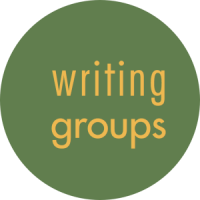How clichéd can a writing workshop get, right? Picture it. Half a dozen writers of various skill levels around a dining room table shuffling drafts back and forth like bridge cards and subtly feeling out one another’s strengths and weaknesses in order to get a sense of where they fit on the skill ladder. That hand I’m holding up and waving around? That’s where the glass of cabernet usually sits. That draft was so intense… lovely characterization… you’re really growing as an author. But no one ever does. Yawn. Stare at the clock.
Enter the Writers Guild, of which I recently became the Tuesday night facilitator. Though I didn’t know who I would have as participants at first, since it was a brand new chapter at the Loop and most of the Monday night chapter can’t make it on those nights, I knew only that I was going to do my best to not let it devolve into the scenario above. I wanted it to be everything I love about workshops and everything I love about hanging out with friends, all at once. I had a loose agenda that I was prepared to sacrifice almost immediately if it meant we could build those bonds and really enrich each other.
And as fate would have it, the first meeting of the Writers Guild was attended by exactly three people, one of whom was an non-native-English-speaking international writer I was fairly sure ended up in the group by accident while looking for a different UCWbL service or event. This person didn’t bring any writing of their own, but contributed meaningfully to the conversation just the same. I suspected that this was mostly out of politeness, and that once the error was realized they would move on to whatever it was they’d meant to join.
Imagine my surprise, then, when the second meeting came, attended by the same three writers, and the international writer returned with several short pieces of fiction and non-fiction revealing that this person had not only been in the correct place all along, but was clearly a very skilled writer and storyteller, with command over metaphor in a second language that exceeds plenty of native speakers and writers I know.
All at once, the rusty patina of assumptions and routine had fallen away and the writing group format was alive for me again. Since then in the group we have shared our writing, our personal stories, our views on politics and sociology, our knowledge of the religions and mythologies of different cultures, and most recently we had a discussion of the ways in which our family and the regional histories of our birthplaces shape our storytelling, complimented via the UCWbL’s huge Loop plasma screen by photographs of our families and maps of where we grew up.
Which is to say, I discovered that the writing group can be a place to share the things that make us human, and to examine them with a group of interested and non-judgmental peers. With all respect to my talented and skilled instructors at DePaul, I wonder if the work of learning to be a better writer is more aligned with the work of being a more circumspect and positively social human being? In banishing, if only for an hour and a half, that isolation that we all face as writers, do we accomplish that part of non-directive learning that classrooms and workshops aren’t ideal forums for?
I don’t know the answer to these questions. In fact, I’m so new at this, and at thinking of learning in terms of pedagogical theory, that I’m barely even able to phrase the questions, but for my chapter of The Writers Guild, I intend to find out. We will be informal, we will digress, we will be people first and writers second, and we will grow.
Discover more from UCWbLing
Subscribe to get the latest posts sent to your email.

